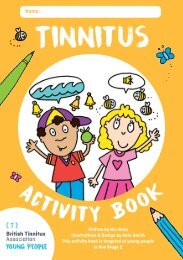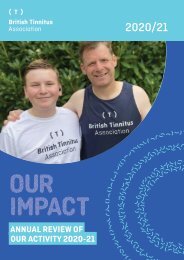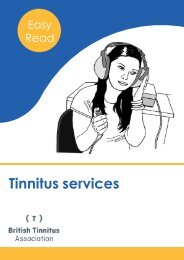Mindfulness for tinnitus Ver 2.1
You also want an ePaper? Increase the reach of your titles
YUMPU automatically turns print PDFs into web optimized ePapers that Google loves.
<strong>Ver</strong>sion <strong>2.1</strong><br />
Written March 2018. Revised April 2019<br />
To be reviewed April 2022<br />
© British Tinnitus Association<br />
MINDFULNESS<br />
FOR TINNITUS<br />
Liz Marks, Laurence McKenna<br />
Royal National Throat, Nose and Ear and Hospital, London<br />
<strong>Mindfulness</strong> is a new approach to<br />
coping with <strong>tinnitus</strong>. This leaflet was<br />
originally published in the BTA journal,<br />
Quiet.<br />
Introduction<br />
To understand how mindfulness can help, it is<br />
important to understand a few things that research<br />
has shown us about <strong>tinnitus</strong>:<br />
It is one of the most common symptoms to affect<br />
humanity<br />
Many people who have <strong>tinnitus</strong> are able to live with it<br />
without suffering<br />
There is mixed evidence <strong>for</strong> the severity of <strong>tinnitus</strong><br />
being directly related to its acoustic characteristics.<br />
Some studies show only small correlations between<br />
loudness and distress/handicap.<br />
It is possible to learn to live with <strong>tinnitus</strong> without<br />
being distressed by it<br />
The psychology of <strong>tinnitus</strong><br />
Over time, most people with <strong>tinnitus</strong> habituate to it.<br />
This is a natural process where the brain adjusts to the<br />
presence of <strong>tinnitus</strong> and stops responding to it. As a<br />
result, the individual becomes less aware of the noise.<br />
Different things can get in the way of habituation,<br />
which may explain why some people remain aware<br />
and distressed by <strong>tinnitus</strong> <strong>for</strong> longer, whilst other<br />
people do not.<br />
Two of the biggest obstacles to habituation are worry<br />
and attentional focus. Sometimes <strong>tinnitus</strong> can be<br />
experienced as so intrusive that people find they<br />
cannot live their life as they wish, and they no longer<br />
enjoy things as they used to. Such changes can make<br />
<strong>tinnitus</strong> seem like an increasing threat and people<br />
become more and more focused on the noises.<br />
This narrows the focus of attention to be more upon<br />
<strong>tinnitus</strong>, and this slows down the natural process of<br />
habituation.<br />
This worry and attentional focus leads people to<br />
change their behaviour in other ways, in particular,<br />
they understandably try do anything and everything<br />
Whilst the BTA makes every attempt to ensure the accuracy and reliability of this in<strong>for</strong>mation,<br />
it is not a substitute <strong>for</strong> medical advice. You should always see your GP/medical professional.
they can to push <strong>tinnitus</strong> away. This might include<br />
using noise or sound generators to mask <strong>tinnitus</strong>,<br />
and avoiding quiet places where <strong>tinnitus</strong> may<br />
become more obvious. They may try to avoid noisy<br />
environments, which they fear will make <strong>tinnitus</strong><br />
worse. Sometimes people may try to keep physically<br />
or mentally busy all of the time so they can ignore<br />
or distract away from <strong>tinnitus</strong>. This ‘fight’ with<br />
<strong>tinnitus</strong> may seem like the only option but it often<br />
makes <strong>tinnitus</strong> worse. Ef<strong>for</strong>ts to push <strong>tinnitus</strong> away<br />
paradoxically keeps <strong>tinnitus</strong> in the centre of attention.<br />
Such demanding mental ef<strong>for</strong>t can lead to exhaustion.<br />
And as <strong>tinnitus</strong> persists, the individual feels as if it<br />
is increasingly uncontrollable, as their usual ways<br />
of fixing a problem are not working. This can lead to<br />
anxiety and low mood, and habituation is also less<br />
likely to happen.<br />
If fighting against <strong>tinnitus</strong> is preventing habituation<br />
and making things worse, then what might happen<br />
if we did the opposite and stopped fighting it?<br />
<strong>Mindfulness</strong>-based therapies suggest just that. Rather<br />
than expending energy on trying to get rid of <strong>tinnitus</strong>,<br />
we can learn to allow it to be present, and this can lead<br />
to a new and less negative relationship to the noises.<br />
What is mindfulness?<br />
<strong>Mindfulness</strong> is a <strong>for</strong>m of meditation that is all about<br />
learning to pay attention to our experience in a specific<br />
way:<br />
“Paying attention… in the present moment, on<br />
purpose and non-judgementally” (Jon Kabat-Zinn)<br />
<strong>Mindfulness</strong> originates from Buddhist meditation<br />
practice, but over the past few decades it has been<br />
taken up by Western medicine and developed into<br />
a non-religious, therapeutic approach to managing<br />
difficult health problems. The founder of this approach,<br />
Jon Kabat-Zinn at the University Of Massachusetts<br />
Medical School, found that it was extremely helpful<br />
<strong>for</strong> patients with chronic stress and illness, <strong>for</strong> whom<br />
standard medical approaches offered little benefit.<br />
have been published demonstrating the wide range<br />
of positive effects that mindfulness meditation<br />
can have across health conditions. For example,<br />
learning mindfulness meditation has been found<br />
to lead to significant benefits <strong>for</strong> people with high<br />
blood pressure, chronic pain, cancer and fatigue.<br />
More recently, mindfulness has been integrated<br />
with modern psychological techniques and is a<br />
proven effective treatment <strong>for</strong> emotional disorders,<br />
particularly depression. <strong>Mindfulness</strong> also benefits<br />
general well-being <strong>for</strong> people without any particular<br />
physical or mental health difficulties. We also have<br />
growing evidence that mindfulness can lead to<br />
improvements in <strong>tinnitus</strong>, which we discuss more<br />
below.<br />
How do I learn<br />
mindfulness?<br />
<strong>Mindfulness</strong> is taught by learning <strong>for</strong>mal meditation<br />
practices, where one is invited to pay purposeful,<br />
present moment-attention to experiences in the<br />
moment. Meditations often ask you to focus in this<br />
way on things such as the breath, body sensations,<br />
visual images or sounds. This quality of mindful<br />
awareness can be brought to daily life, <strong>for</strong> example,<br />
when brushing our teeth, eating a meal or washing the<br />
dishes.<br />
For most of us, these activities have become so<br />
automatic we conduct them on ‘autopilot’. Rather than<br />
focusing on what is happening in the present moment,<br />
our mind wanders far away – replaying past events,<br />
worrying about the future, or simply planning what is<br />
<strong>for</strong> dinner. <strong>Mindfulness</strong> brings us back to the present<br />
moment, which has many advantages. It can enrich<br />
our present experience as we become more aware of<br />
all of our senses. It can also help us to get less caught<br />
up in negative thoughts, feelings and behaviours that<br />
can drive emotional distress, and our experience of<br />
<strong>tinnitus</strong>.<br />
Since the 1980’s, hundreds of research articles<br />
Whilst the BTA makes every attempt to ensure the accuracy and reliability of this in<strong>for</strong>mation,<br />
it is not a substitute <strong>for</strong> medical advice. You should always see your GP/medical professional.
How can mindfulness help<br />
<strong>tinnitus</strong>?<br />
“I find I am more accepting of my <strong>tinnitus</strong> and so it is<br />
less intrusive. I can live with it more easily”<br />
<strong>Mindfulness</strong> does not aim to ‘fix’ <strong>tinnitus</strong> or make it go<br />
away, but rather make it less intrusive, to a point where<br />
it is no longer a problem <strong>for</strong> people. It teaches one how<br />
to live alongside difficulties such as <strong>tinnitus</strong>, without<br />
having to fight or change it. Practising mindfulness<br />
meditation can cultivate a more helpful way of<br />
responding to <strong>tinnitus</strong>, by encouraging gentle interest,<br />
curiosity, non-judgement and even acceptance, rather<br />
than ‘fighting it’ or ‘pushing it away’. <strong>Mindfulness</strong> does<br />
not aim to change the nature or sound of the <strong>tinnitus</strong>,<br />
instead, it can help us come to a better relationship<br />
with it, and this can aid habituation.<br />
It can be difficult to change how we react to something<br />
like <strong>tinnitus</strong>, so mindfulness therapy <strong>for</strong> <strong>tinnitus</strong> begins<br />
slowly. In treatment, we begin by learning how to pay<br />
mindful attention to other aspects of our daily life,<br />
such as eating, the sensations in parts of the body<br />
or feeling the physical sensations of the breath. This<br />
is done in a group, alongside other people who also<br />
struggle with <strong>tinnitus</strong>, and who are probably new<br />
to mindfulness. We go through simple meditations<br />
together and you also practice these at home. Regular<br />
home practice is important as it helps you to become<br />
more familiar with the technique and discover what<br />
mindfulness is really about.<br />
Later on in the group, it is possible to begin to spend<br />
brief moments deliberately paying mindful attention<br />
to sound and <strong>tinnitus</strong>. Understandably, this can lead<br />
to some anxiety, and the group offers a way to test out<br />
these fears, and in a way that allows you to feel safe.<br />
By ‘turning towards’ the sounds, with an attitude of<br />
calmly and gently allowing people may find that the<br />
sounds do not appear as threatening as expected.<br />
Research also shows that people who learn to become<br />
more able to ‘allow’ <strong>tinnitus</strong> will find it less distressing<br />
over time.<br />
difficult experiences generally, including <strong>tinnitus</strong>.<br />
Many people describe negative thoughts about<br />
<strong>tinnitus</strong> (the losses it has led to, and the fears of what<br />
will happen in the future). These negative thoughts<br />
can cause powerful emotional responses such<br />
as anxiety, anger or sadness, and keep the mind<br />
fixated on the <strong>tinnitus</strong>, preventing habituation. By<br />
becoming more aware through mindfulness practice,<br />
we learn to ‘recognise’ these thoughts. We can also<br />
recognise how they can spiral into familiar patterns of<br />
emotions and behaviours. The insight gained through<br />
meditation can allow us to choose how to respond<br />
these negative thoughts so that they are less likely to<br />
lead automatically to painful emotions and unhelpful<br />
behaviour.<br />
Our experiences with<br />
<strong>tinnitus</strong> and mindfulness<br />
Since 2010, we have been offering <strong>Mindfulness</strong> Based<br />
Cognitive Therapy (MBCT) to patients with chronic<br />
<strong>tinnitus</strong> attending the Royal National Throat Nose and<br />
Ear Hospital. Our treatment is based on the standard<br />
8-week MBCT course that is offered in other settings,<br />
however, we have adapted it <strong>for</strong> people with troubling<br />
<strong>tinnitus</strong>, and it is taught by clinical psychologists<br />
with expertise in working with <strong>tinnitus</strong> and other<br />
audiological conditions. Since this time, hundreds<br />
of patients have attended our groups and we have<br />
gathered strong evidence that this approach is of great<br />
benefit to them.<br />
In 2017 we published two papers that demonstrate<br />
that MBCT is an effective treatment <strong>for</strong> people with<br />
distressing <strong>tinnitus</strong>:<br />
A randomised controlled trial, funded by the British<br />
Tinnitus Association, compared MBCT <strong>for</strong> <strong>tinnitus</strong><br />
to Relaxation Training. This study clearly showed<br />
that MBCT led to significant reductions in the<br />
distress caused by <strong>tinnitus</strong> than Relaxation. These<br />
improvements lasted <strong>for</strong> longer and got even better<br />
in the six months following treatment. It also led to<br />
reduced levels of emotional distress and disability.<br />
This practice also reveals our habitual responses to<br />
Whilst the BTA makes every attempt to ensure the accuracy and reliability of this in<strong>for</strong>mation,<br />
it is not a substitute <strong>for</strong> medical advice. You should always see your GP/medical professional.
We looked at how patients were be<strong>for</strong>e and after<br />
attending MBCT routinely in our clinic. We followed 188<br />
patients from the beginning to the end of the course<br />
of meditation and found that the treatment was<br />
associated with significant and reliable improvements<br />
in <strong>tinnitus</strong>-related and emotional distress.<br />
We also asked patients to give us feedback on their<br />
experiences of mindfulness. Most of the feedback was<br />
extremely positive, and showed how treatment helped<br />
people not only to habituate to <strong>tinnitus</strong> but also to cope<br />
with other difficulties that life throws at us:<br />
“The mindfulness course I attended <strong>for</strong> <strong>tinnitus</strong> gave<br />
me many practical and effective ways of alleviating<br />
my distress. It has improved my well-being and my<br />
everyday life. It has proved to be a positive and lasting<br />
gift - and I know many of the people on the course feel<br />
the same.”<br />
“Completing the mindfulness course gave me a tool<br />
with which to finally try to cope with <strong>tinnitus</strong> and the<br />
resultant stress. It was not a cure and was never sold<br />
as such but it offered a way of approaching life, not<br />
just <strong>tinnitus</strong>, which showed that there were ways of<br />
trying to alleviate the significant distress caused by<br />
this chronic condition.”<br />
“I am more able to observe myself having worries<br />
or fear and to pull back rather than getting<br />
overwhelmed. I am seeing more clearly that I don’t<br />
have to continue negative thought sequences”<br />
“Mindful meditation helped me to think (and not<br />
think) about <strong>tinnitus</strong> in ways that had not occurred<br />
be<strong>for</strong>e, and in doing so made <strong>tinnitus</strong> much less of a<br />
burden to carry. It did not fix my <strong>tinnitus</strong> but it fixed<br />
me in a way that made <strong>tinnitus</strong> easier to bear. I now<br />
feel as if I live in the same universe as everybody else.<br />
I wouldn’t be anywhere else.”<br />
The mindfulness approach is radically different<br />
from what most <strong>tinnitus</strong> sufferers have tried<br />
be<strong>for</strong>e, and it may not be right <strong>for</strong> everyone. We<br />
are confident, however, that the growing research<br />
base has demonstrated how it can offer an exciting<br />
new approach to people who may have found that<br />
traditional treatment has not been able to help them.<br />
Further reading/resources<br />
Mindful meditation courses are taught across the<br />
country, although at this time, few have been adapted<br />
to be <strong>tinnitus</strong>-specific, something that may change<br />
in the future. It is also possible to learn a lot about<br />
mindfulness from the many books and websites that<br />
are available on the topic. We would recommend the<br />
following as a place to start:<br />
The Mindful Way through Depression by Mark Williams,<br />
John Teasdale, Zindel Segal & Jon Kabat-Zinn.<br />
The Mindful Manifesto by Dr Jonty Heaversedge & Ed<br />
Halliwell<br />
Centre <strong>for</strong> <strong>Mindfulness</strong> Research and Practice, Bangor<br />
University. www.bangor.ac.uk/mindfulness/<br />
www.bemindful.co.uk<br />
www.breathworks-mindfulness.org.uk/<br />
For further in<strong>for</strong>mation<br />
Our helpline staff can answer your questions on any<br />
<strong>tinnitus</strong> related topics on 0800 018 0527. You may<br />
also find our website takeon<strong>tinnitus</strong>.co.uk helpful.<br />
BTA publications<br />
Our in<strong>for</strong>mation leaflets are written by leading <strong>tinnitus</strong><br />
professionals and provide accurate, reliable and<br />
authoritative in<strong>for</strong>mation which is updated regularly.<br />
Please contact us if you would like to receive a copy of<br />
any of our in<strong>for</strong>mation leaflets listed below, or they can<br />
be downloaded from our website. *available in Easy<br />
Read<br />
All about <strong>tinnitus</strong>*<br />
Complementary therapy <strong>for</strong> <strong>tinnitus</strong>: an opinion<br />
Drugs and <strong>tinnitus</strong><br />
Ear wax removal and <strong>tinnitus</strong><br />
Whilst the BTA makes every attempt to ensure the accuracy and reliability of this in<strong>for</strong>mation,<br />
it is not a substitute <strong>for</strong> medical advice. You should always see your GP/medical professional.
Flying and the ear<br />
Food, drink and <strong>tinnitus</strong><br />
Hearing aids and <strong>tinnitus</strong>*<br />
Hyperacusis<br />
Ideas <strong>for</strong> relaxation without sound<br />
In<strong>for</strong>mation <strong>for</strong> musicians<br />
<strong>Mindfulness</strong> <strong>for</strong> <strong>tinnitus</strong><br />
Musical hallucination (musical <strong>tinnitus</strong>)<br />
Noise and the ear<br />
Otosclerosis<br />
Pulsatile <strong>tinnitus</strong><br />
Relaxation<br />
Self help <strong>for</strong> <strong>tinnitus</strong>*<br />
Sound therapy<br />
Sources of mutual support <strong>for</strong> <strong>tinnitus</strong><br />
Supporting someone with <strong>tinnitus</strong><br />
Taming <strong>tinnitus</strong><br />
Tinnitus and disorders of the temporo-mandibular joint<br />
(TMJ) and neck<br />
Tinnitus: a parent’s guide<br />
Tinnitus: a teacher’s guide<br />
Tinnitus and sleep disturbance<br />
Tinnitus and stress<br />
Tinnitus services*<br />
Leaflets <strong>for</strong> children:<br />
Ellie, Leila and Jack have <strong>tinnitus</strong> (<strong>for</strong> under 8s)<br />
Tinnitus (<strong>for</strong> 8-11 year olds)<br />
Tinnitus (<strong>for</strong> 11-16 year olds)<br />
Ellie, Leila and Jack have <strong>tinnitus</strong> activity book<br />
Tinnitus activity book (<strong>for</strong> 8-11 year olds)<br />
Tinnitus activity book (<strong>for</strong> 11-16 year olds)<br />
Whilst the BTA makes every attempt to ensure the accuracy and reliability of this in<strong>for</strong>mation,<br />
it is not a substitute <strong>for</strong> medical advice. You should always see your GP/medical professional.
British Tinnitus Association<br />
Ground Floor, Unit 5, Acorn Business Park, Woodseats Close, Sheffield S8 0TB<br />
Email: helpline@<strong>tinnitus</strong>.org.uk<br />
Helpline: 0800 018 0527<br />
Website: <strong>tinnitus</strong>.org.uk<br />
The British Tinnitus Association. Registered charity no: 1011145 Company limited by guarantee no: 2709302. Registered in England. This in<strong>for</strong>mation has<br />
been produced by the BTA and con<strong>for</strong>ms to the Principles and Requirements of the In<strong>for</strong>mation Standard.<br />
Whilst the BTA makes every attempt to ensure the accuracy and reliability of this in<strong>for</strong>mation,<br />
it is not a substitute <strong>for</strong> medical advice. You should always see your GP/medical professional.


















